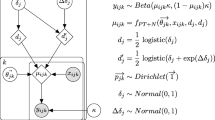Abstract
Some misconceptions in learning and understanding statistical or probabilistic concepts stem from the use of what is called the “representativeness heuristic” for solving such problems. Incorrect solutions to problems is the result. This study provided graduate students enrolled in beginning inferential statistics with a series of experiences which seemed to disrupt such faulty logic by having them experience logical inconsistencies. Such direct experimental involvement with applied probability problems was recommended as a means to enhance the use of more appropriate probabilistic reasoning in subsequent statistical or probability problems.
Similar content being viewed by others
References
Fischbein, E. and Gazit, A.: 1984, ‘Does teaching of probability improve probabilistic intuitions?’,Educational Studies in Mathematics 15, 1–24.
Garfield, J. and Ahlgren, A.: 1988, ‘Difficulties in learning basic concepts in probability and statistics: Implications for research’,Journal for Research in Mathematics Education 19, 44–63.
Hawkins, A. S. and Kapadia, R.: 1984, ‘Children's conceptions of probability — a psychological and pedagogical review’,Educational Studies in Mathematics 15, 349–377.
Kahneman, D. and Tversky, A.: 1972, ‘Subjective probability: A judgment of representativeness’,Cognitive Psychology 3, 430–454.
Kahneman, D. and Tversky, A.: 1973, ‘On the psychology of prediction’,Psychological Review 80, 237–251.
Kahneman, D., Slovic, P. and Tversky, A. (eds.): 1982,Judgment Under Uncertainty: Heuristics and Biases, Cambridge University Press, Cambridge.
Piaget, J. and Inhelder, B.: 1975,The Origin of the Idea of Chance in Children, W.W. Norton & Company, Inc.
Paulos, J. A.: 1988,Innumeracy: Mathematical Illiteracy and its Consequences, Hill and Wang, New York.
Phillips, J. L.Jr.: 1969,The Origins of Intellect. Piaget's Theory, W.H. Freeman and Comapny, San Francisco.
Shaughnessy, J. M.: 1977, ‘Misconceptions of probability: An experiment with a small-group, acitvity-based, model building approach to introductory probability at the college level’,Educational Studies in Mathematics 8, 295–316.
Tversky, A. and Gilovich, T.: 1989, ‘The cold facts about the “hot hand” in basketball’,Chance 2(1), 16, 21.
Tversky, A. and Kahneman, D.: 1982a, ‘Judgment under uncertainty: Heuristics and biases’, in Kahneman, Slovic, and Tversky (eds.),Judgment under Uncertainty: Heuristics and Biases, Cambridge University Press, Cambridge.
Tversky, A. and Kahneman, D.: 1982b, ‘Belief in the law of small numbers’, in Kahneman, Slovic, and Tversky (eds.),Judgment under Uncertainty: Heuristics and Biases, Cambridge University Press, Cambridge.
Tversky, A. and Kahneman, D.: 1982c, ‘Judgments of and by representativeness’, in Kahneman, Slovic, and Tversky (eds.),Judgment under Uncertainty: Heuristics and Biases, Cambridge University Press, Cambridge.
Author information
Authors and Affiliations
Rights and permissions
About this article
Cite this article
Cox, C., Mouw, J.T. Disruption of the representativeness heuristic: Can we be perturbed into using correct probabilistic reasoning?. Educ Stud Math 23, 163–178 (1992). https://doi.org/10.1007/BF00588054
Issue Date:
DOI: https://doi.org/10.1007/BF00588054




